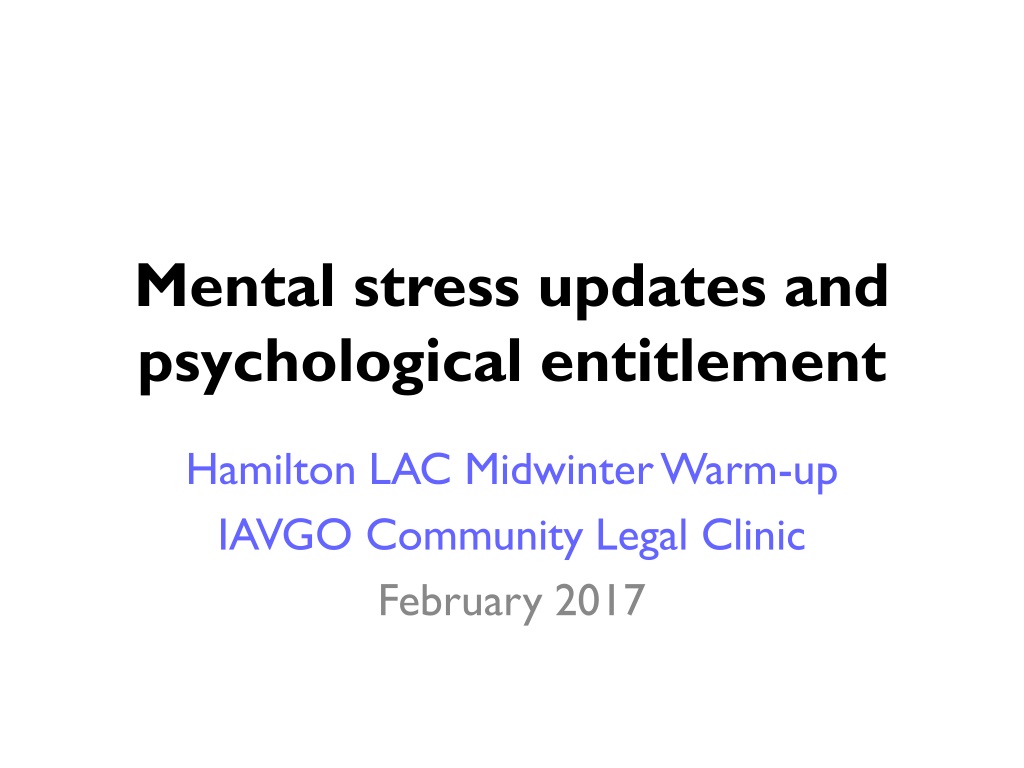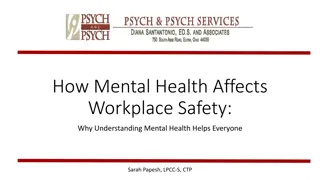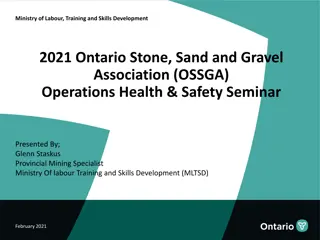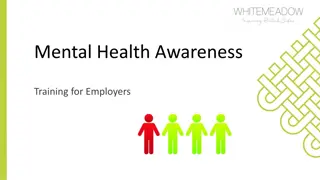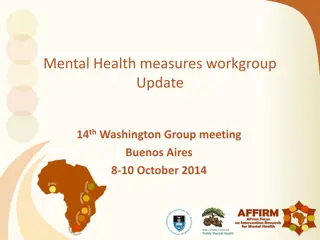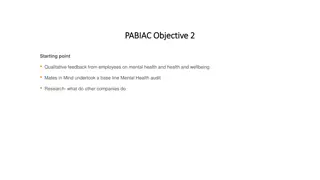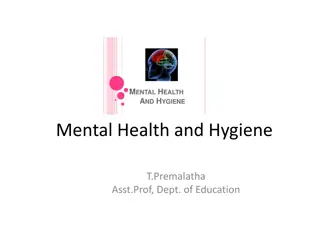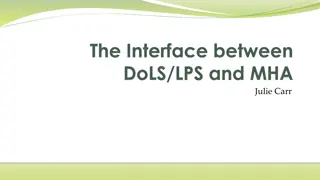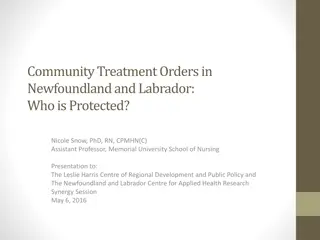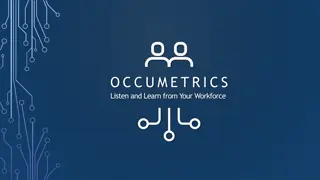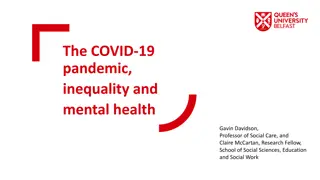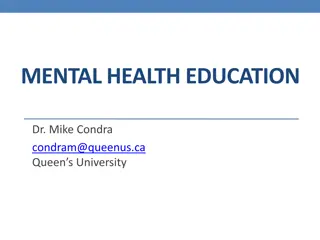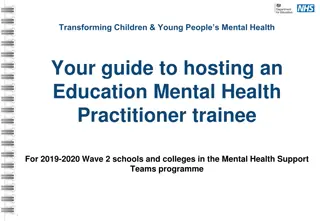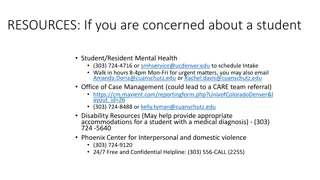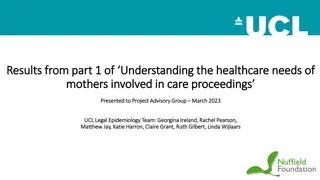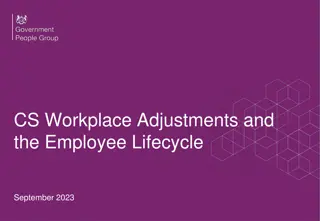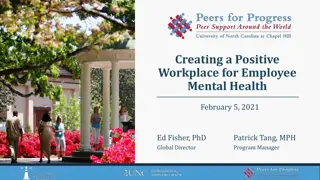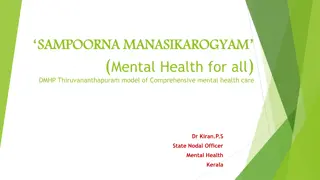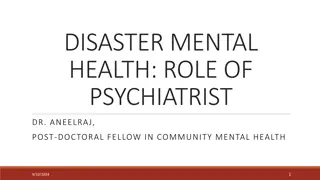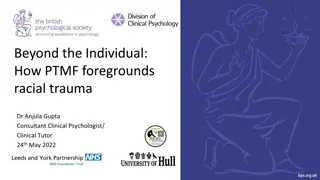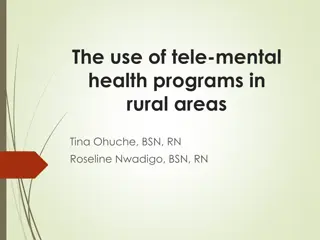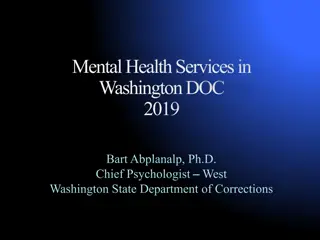Insights on WSIB Decisions and Mental Health Challenges in Workplace
Recent trends in WSIB decisions concerning mental health challenges, including issues with entitlement, weighing medical evidence, denials based on pre-existing conditions, and the impact on workers. Various cases are discussed where differing medical opinions have influenced outcomes. The struggle for recognition and support for mental health issues in the workplace is highlighted.
Download Presentation

Please find below an Image/Link to download the presentation.
The content on the website is provided AS IS for your information and personal use only. It may not be sold, licensed, or shared on other websites without obtaining consent from the author. Download presentation by click this link. If you encounter any issues during the download, it is possible that the publisher has removed the file from their server.
E N D
Presentation Transcript
Mental stress updates and psychological entitlement Hamilton LAC Midwinter Warm-up IAVGO Community Legal Clinic February 2017
Overview 1 What are recent trends in WSIB decisions involving mental health? How do WSIB practices target or affect workers with mental health challenges? What is the current law on mental stress? 2 3
1. Decision Trends Entitlement and weighing of medical evidence Denials based on pre-existing factors Presumed recovery Stigmatizing Return to work and mental health
Entitlement and weighing medical evidence The WSIB s decisions on psycho traumatic entitlement are often contrary to all the evidence or the unanimous medical opinion.
Given the unanimous opinion of the workers treating and assessing health care providers I am satisfied that her depression and anxiety is attributable to her persistent and ongoing bilateral shoulder pain and the associated extended disablement she endures. 907/16
This conclusion that was reached by the ARO is however contradicted by the opinions of all the three health care professionals it is my unequivocal professional opinion that [the worker s] major depression is a direct result of his compensable injury There no mention of this opinion from Dr. Kwamie in the ARO s decision in this matter. 1532/16
I relied on significant medical evidence on file from several psychiatrists and psychologists that assessed and treated the worker over the years, since 2004, all of whom unequivocally opined that the worker had treatment resistant PTSD with symptoms of severe depression, which rendered him unemployable. There was no medical opinion of significance to challenge this conclusion. 2978/16
Denials based on pre-existing The WSIB often denies psych entitlement based on pre-existing conditions without any or adequate evidentiary foundation.
The Panel is aware that the Board concluded that the worker currently had non-compensable psychological/psychiatric conditions that included a history of onset dating back to when the worker was a young child. The Panel finds that this conclusion is not supported by the evidence on file, and we are aware of no medical reporting that indicates that the worker sought or required psychiatric treatment prior to July of 2004. 694/16
Dr. Oosterhoff did not suggest that any component of the worker s psychological condition was due to experiences in her country of origin, her past divorce, or preexisting health conditions. Accordingly, there is no substantial basis for concluding that these factors, which caused no psychological condition prior to the injury, somehow overwhelmed the causal contribution of her traumatic workplace injury in perpetuating her ongoing psychological condition. 2824/16
Presumed recovery The WSIB often assumes presumes recovery contrary to the evidence.
The Board has also determined, however, that the worker s compensable psychological condition was only temporary in nature. There is no evidence of substance that the worker does not suffer from a compensable psychological condition on an ongoing basis. 1007/16
On this evidence, and the testimony of the worker at the hearing, the Panel is persuaded that the worker s psychotraumatic disability, which has been accepted by the Board as a compensable condition on a temporary basis, has become permanent. Indeed, all available medical evidence supports this finding. 43 16
The Panel has considered that the worker was affected by post-traumatic stress disorder a significant 53% NEL award, and his treating physicians never suggested that he could return to pre-accident work associated with heavy equipment operation. The Board felt in 2011 that surveillance evidence from 2007, showing that the worker could walk and park a vehicle in the general vicinity of a construction work- site, supported the find that he could return to heavy equipment operation. . The suggestion by the Board s operating level and WT specialist in 2011 that the worker s compensable condition had resolved is without foundation. 1087/16
Stigma WSIB findings appear to stigmatize or draw into question workers genuineness without foundation.
The ARO also suggested that the workers presentation was not genuine because she was tearful during the ARO hearing but was observed leaving the building walking, holding, and swinging her large purse in her right hand. The suggestion that the worker lacked genuineness is contrary to the weight of evidence on file. Despite her traumatic injury, the worker demonstrated cooperation and motivation . The employer expressed admiration for the worker s courage in returning to the workplace after her serious injury. 2824/16
Based on the findings made by the ARO in that decision, there was no reason for the worker to expect that the genuine nature of his psychiatric complaints was in question . as opposed to being offered psychological treatment . The CM s conviction that there was a lack of genuineness in the worker s presentation and a failure to cooperate was reflected in the decision to commit very substantial Board resources to obtaining a new IPE and conducting covert surveillance of the worker. 2264/15
Return to work and mental health The WSIB often ignores mental health conditions in considering return to work.
Furthermore, the Panel notes that in addition to the above evidence, the Board has requested the opinions from its own medical consultants such as Dr.Smith, Dr. Piccolo and Dr. Radziuk, psychologists, all of whom indicated that the worker was essentially unemployable. 1278/16
Part of the workers functional abilities, as noted above, relate to her non-compensable psychological and epileptic conditions. All SEB options proposed had limited employment prospects, were physically unsuitable to the worker or were not cost-effective or viable due to educational requirements. As submitted by Ms. Brissette, it appears unlikely that if the worker were unemployable in 2009 she would become so three years later. 920/16
The occupations suggested by the WSIB and the employer for the worker do not appear to meet the worker s psychological restrictions and the psychological supports that were identified as required by even the most optimistic of the psychological consultants involved in assessing or treating the worker have not been implemented. 589/16
In the absence of support and after participating in a rigid LMR plan, in our view, it is not surprising that the worker s psychological functioning had worsened by 2009. 1567/15
For reasons that are not clear to the Panel, the non-organic aspects of the worker s condition were not taken into account by the Board in the 2011 WT process. The occupational therapist cautioned that the worker s depression, her problems with memory and concentration required further attention. This was not addressed. 1703/16
2. WSIB practices that target workers with mental health injuries 5 years of pre accident records Mining for non compensable excuses Special team High denial rate High denial rate (40% in 2013) and an extremely high rate of only temporary entitlement (74% of allowed claims). IAVGO FOI request, reply of WSIB, May 29, 2014.
WSIB practices Surveillance http://iavgo.org/wp-content/uploads/2013/11/new-surveillance-guideline-WSIB-2015.pdf Bad medical consultants / IMEs
3. Mental stress (4) Except as provided in subsection (5), a worker is not entitled to benefits under the insurance plan for mental stress. (5) A worker is entitled to benefits for mental stress that is an acute reaction to a sudden and unexpected traumatic event arising out of and in the course of his or her employment.
Mental stress The WSIAT has ruled that these restrictions are unconstitutional 3 times : 2157/09, 1945/10, 665/10
Mental stress In this case, we have found that subsections 13(4) and the portion of 13(5) of theWSIA that restricts entitlement to an acute reaction to a sudden and unexpected traumatic event (and the related TMS policy) infringe the worker s right to equality under section 15 of the Charter, and that infringement is not justified under section 1 of the Charter. Accordingly, through the application of section 52(1) of the Constitution Act, 1982, we decline to apply subsections 13(4) and (5) of theWSIA and the TMS policy in this appeal. 2157 09
Mental stress The rationale for singling out mental stress claims from other physical injuries and conditions is not supported by the evidence, particularly when the evidence indicates that the association between job strain and mental disorders is comparable to the nature of the evidence in many claims for occupational disease. 2157/ 09
Mental stress But the discriminatory law (and policy) remains. It is still the law.
Mental stress You must file notice of constitutional question or WSIAT will apply the law and may deny claim e.g. 2078/15 In the absence of a notice of constitutional question the Panel must apply the provisions of sections 13(4) and (5) of the Act. 2334/15
Mental stress How can a discriminatory law be applied? ??? Complaints to Human Rights Commissioner Complaints to Ombudsman Ontario I am aware of the Workplace Safety and Insurance Tribunal (WSIAT) decisions regarding entitlement for mental stress. As you note, the government did not apply for a judicial review of the WSIAT decisions. At this time the government continues to consider options on next steps. Minister of Labour, email May 19, 2016
First responders and PTSD Section14 of the WSIA now creates a presumption for first responders that their PTSD arose out of and in the course of employment unless the contrary was shown.
First responders and PTSD If a first responder or other designated worker is diagnosed with posttraumatic stress disorder (PTSD) and meets specific employment and diagnostic criteria, the first responder or other designated worker's PTSD is presumed to have arisen out of and in the course of his or her employment, unless the contrary is shown. 15-03-13
First responders and PTSD However, the proposed amendments are carefully restricted to PTSD, so that emergency response workers who develop any other disabling mental illness (e.g. depression) will be left out in the cold. Worse still, the announcement implies that the government has no intention of providing any relief to other kinds of workers who develop a mental illness as a result of their work Antony Singleton, February 29, 2016,
Thank you. Questions? Call IAVGO: 416 924 6477
